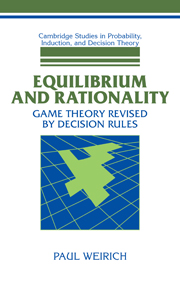3 - Equilibrium
Published online by Cambridge University Press: 18 March 2010
Summary
The main tenet of decision theory is that a rational decision maximizes utility or, where there is uncertainty, maximizes expected utility. The main tenet of game theory is that a solution is a Nash equilibrium. The unification of decision theory and game theory requires modifications in the main tenet of each theory. Decisions in games raise complications that call for amendments to decision principles. The amended decision principles in turn call for amendments to solution standards. My project is to revise the main tenets of decision theory and game theory in order to accommodate the existence of an equilibrium in every ideal game. Our revision of the equilibrium standard for solutions rests on revisions of decision principles, in particular, the principle of self-support, a principle that plays an important role in strategic reasoning. This chapter explains the relationships among strategic reasoning, self-supporting decisions, and equilibrium.
EQUILIBRIUM DEFINED
Solutions and equilibria are closely related. A profile is a solution only if it is an equilibrium. Solutions involve joint rationality, whereas equilibria involve joint self-support, a component of joint rationality. The close relationship between solutions and equilibria guides our definition of an equilibrium. Acknowledging that being an equilibrium is necessary for being a solution, we make the definition of an equilibrium analogous to the definition of a solution:
An equilibrium is a profile of strategies that are self-supporting given that the profile is realized.
The supposition is made in the same way as for profiles that are solutions.
Our definition of equilibrium uses joint self-support, or self-support relative to a profile. A strategy's being self-supporting given a profile is its being self-supporting given a profile containing the strategy.
- Type
- Chapter
- Information
- Equilibrium and RationalityGame Theory Revised by Decision Rules, pp. 48 - 73Publisher: Cambridge University PressPrint publication year: 1998



